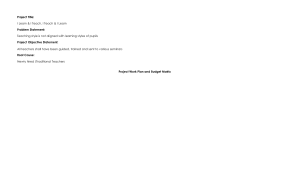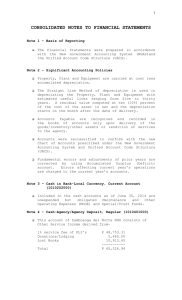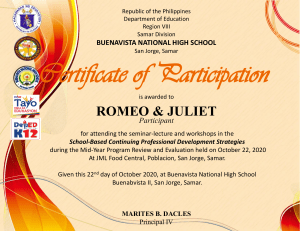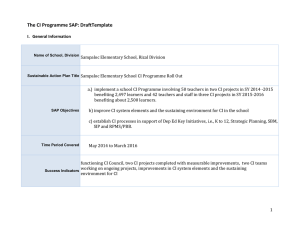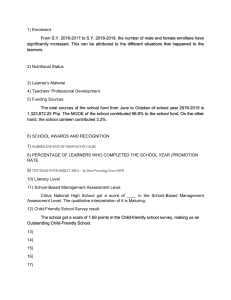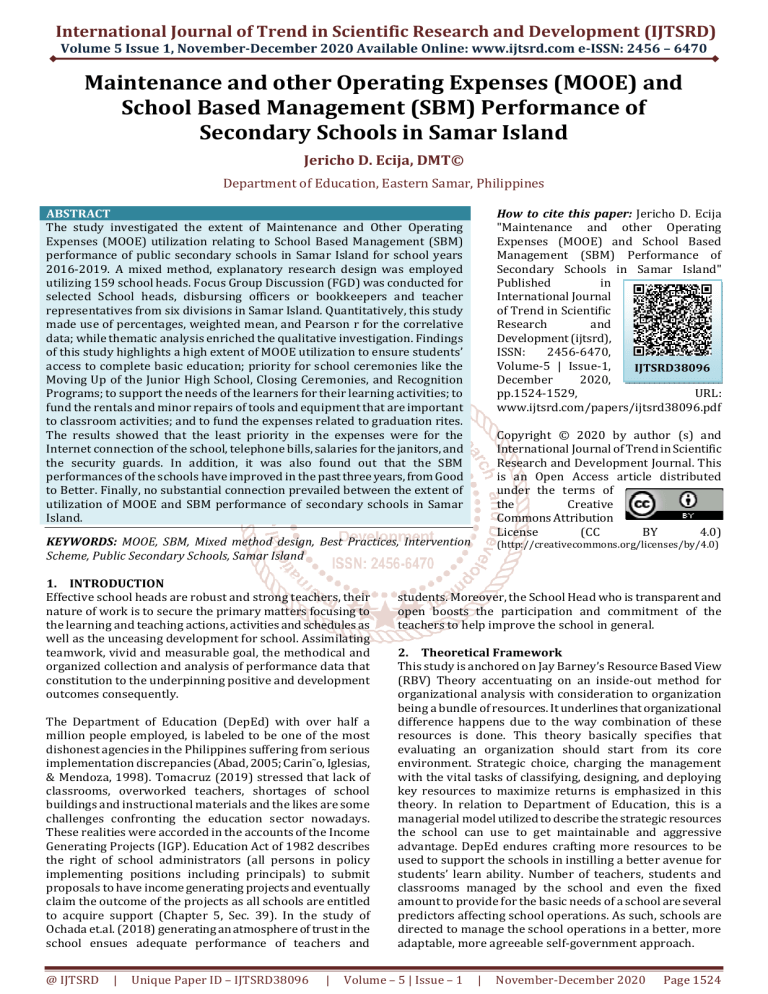
International Journal of Trend in Scientific Research and Development (IJTSRD)
Volume 5 Issue 1, November-December 2020 Available Online: www.ijtsrd.com e-ISSN: 2456 – 6470
Maintenance and other Operating Expenses (MOOE) and
School Based Management (SBM) Performance of
Secondary Schools in Samar Island
Jericho D. Ecija, DMT©
Department of Education, Eastern Samar, Philippines
ABSTRACT
The study investigated the extent of Maintenance and Other Operating
Expenses (MOOE) utilization relating to School Based Management (SBM)
performance of public secondary schools in Samar Island for school years
2016-2019. A mixed method, explanatory research design was employed
utilizing 159 school heads. Focus Group Discussion (FGD) was conducted for
selected School heads, disbursing officers or bookkeepers and teacher
representatives from six divisions in Samar Island. Quantitatively, this study
made use of percentages, weighted mean, and Pearson r for the correlative
data; while thematic analysis enriched the qualitative investigation. Findings
of this study highlights a high extent of MOOE utilization to ensure students’
access to complete basic education; priority for school ceremonies like the
Moving Up of the Junior High School, Closing Ceremonies, and Recognition
Programs; to support the needs of the learners for their learning activities; to
fund the rentals and minor repairs of tools and equipment that are important
to classroom activities; and to fund the expenses related to graduation rites.
The results showed that the least priority in the expenses were for the
Internet connection of the school, telephone bills, salaries for the janitors, and
the security guards. In addition, it was also found out that the SBM
performances of the schools have improved in the past three years, from Good
to Better. Finally, no substantial connection prevailed between the extent of
utilization of MOOE and SBM performance of secondary schools in Samar
Island.
How to cite this paper: Jericho D. Ecija
"Maintenance and other Operating
Expenses (MOOE) and School Based
Management (SBM) Performance of
Secondary Schools in Samar Island"
Published
in
International Journal
of Trend in Scientific
Research
and
Development (ijtsrd),
ISSN:
2456-6470,
Volume-5 | Issue-1,
IJTSRD38096
December
2020,
pp.1524-1529,
URL:
www.ijtsrd.com/papers/ijtsrd38096.pdf
KEYWORDS: MOOE, SBM, Mixed method design, Best Practices, Intervention
Scheme, Public Secondary Schools, Samar Island
(http://creativecommons.org/licenses/by/4.0)
1. INTRODUCTION
Effective school heads are robust and strong teachers, their
nature of work is to secure the primary matters focusing to
the learning and teaching actions, activities and schedules as
well as the unceasing development for school. Assimilating
teamwork, vivid and measurable goal, the methodical and
organized collection and analysis of performance data that
constitution to the underpinning positive and development
outcomes consequently.
The Department of Education (DepEd) with over half a
million people employed, is labeled to be one of the most
dishonest agencies in the Philippines suffering from serious
implementation discrepancies (Abad, 2005; Carin˜o, Iglesias,
& Mendoza, 1998). Tomacruz (2019) stressed that lack of
classrooms, overworked teachers, shortages of school
buildings and instructional materials and the likes are some
challenges confronting the education sector nowadays.
These realities were accorded in the accounts of the Income
Generating Projects (IGP). Education Act of 1982 describes
the right of school administrators (all persons in policy
implementing positions including principals) to submit
proposals to have income generating projects and eventually
claim the outcome of the projects as all schools are entitled
to acquire support (Chapter 5, Sec. 39). In the study of
Ochada et.al. (2018) generating an atmosphere of trust in the
school ensues adequate performance of teachers and
@ IJTSRD
|
Unique Paper ID – IJTSRD38096
|
Copyright © 2020 by author (s) and
International Journal of Trend in Scientific
Research and Development Journal. This
is an Open Access article distributed
under the terms of
the
Creative
Commons Attribution
License
(CC
BY
4.0)
students. Moreover, the School Head who is transparent and
open boosts the participation and commitment of the
teachers to help improve the school in general.
2. Theoretical Framework
This study is anchored on Jay Barney’s Resource Based View
(RBV) Theory accentuating on an inside-out method for
organizational analysis with consideration to organization
being a bundle of resources. It underlines that organizational
difference happens due to the way combination of these
resources is done. This theory basically specifies that
evaluating an organization should start from its core
environment. Strategic choice, charging the management
with the vital tasks of classifying, designing, and deploying
key resources to maximize returns is emphasized in this
theory. In relation to Department of Education, this is a
managerial model utilized to describe the strategic resources
the school can use to get maintainable and aggressive
advantage. DepEd endures crafting more resources to be
used to support the schools in instilling a better avenue for
students’ learn ability. Number of teachers, students and
classrooms managed by the school and even the fixed
amount to provide for the basic needs of a school are several
predictors affecting school operations. As such, schools are
directed to manage the school operations in a better, more
adaptable, more agreeable self-government approach.
Volume – 5 | Issue – 1
|
November-December 2020
Page 1524
International Journal of Trend in Scientific Research and Development (IJTSRD) @ www.ijtsrd.com eISSN: 2456-6470
Review of Related Literature
Quality education is essential in the child’s preservation of
the Philippine culture; and economic well-being and
substantial resources contribute to quality education.
Republic Act 9155 recognizes school heads the capacity to
execute instructional and administrative supervision of the
school. This law points out that school leader has these
functions: (1) Personnel, physical and fiscal resources
administration; (2) Acceptance of donations in updating
teaching competencies, school facilities and providing
instructional materials and equipment. This function
includes financial management function. Fiscal resources
refer to school finances which include the appropriated
budgetary allocation for the school (Official Gazette, 2001).
DepEd Order No. 12 (2016) defines the MOOE as the school
budget from the government which is given to all public
schools. Procurement of school supplies, payment for
utilities and expense in communication, training activities,
recognition and graduation rites, security, janitorial services,
and minor school repair compose this allocation. These
items are stated in the approved School Improvement Plan
(SIP and the Annual Improvement Plan (AIP) of the school.
In addition, the Order demands apt and ideal use of school
resources and mechanisms to project transparency and
accountability. Considerably, all schools are governed by
Republic Act 9485 (Anti-Red Tape Act of 2007) to post a
Transparency Board on MOOE.
Moreover, DepEd Order No. 13 dictates all school heads to
assume the ensuing duties: (1) state all sources of funding of
the school allocated in the MOOE; (2) outline the projected
use of all sources of funds; (3) disseminate publicly the
sources in the transparency board and update the
information every three months (4) relay officially the
sources and uses of school funds to the stakeholders. The
ability to manage MOOE is best perceived in the mechanisms
of the schools daily. With the appropriation of funds, school
leaders are empowered to operate and maintain the school.
This then makes the principals more accountable because of
the blanket authority given to them. On the other hand, if the
organization is lax with accountability, uncertainties,
irregularities and unjust behaviors will be commonplace.
Therefore, accountability identifies what resources were
used by the school staff taking into considerations the
parameters to reach the organizational goals. On the flipside,
accountability should also reveal the shortfalls and errors in
the given services and hopefully identifies the culprits
correctly.
The mission, vision, and goals stated in DepEd, despite the
challenging task led an organization, school heads in public
institution were finding means to achieve the
abovementioned. Apart from these trails comprise is the
liquidation of MOOE. Considerably, in the article of Mayor
(2019), in the DepEd Schools Division of Cebu, the school
head in certain public school disclosed that the delay of
liquidation of the MOOE are due to absence of canvassers,
means of transportation, carpenters or workers to do
repairs, insufficient MOOE funds for repair, delay of
releasing of checks, and, time. All these concerns worsen the
task of the administrator in the demand of a transparent
MOOE usage. Certainly, these are just some of the many
@ IJTSRD
|
Unique Paper ID – IJTSRD38096
|
other struggles that a school head encounters in taking risks
to achieve goals of the Education department.
The school heads need to solve many managerial problems
adding to the delay in liquidating cash advances. Other
problems will never occur if the common problems are
solved.
In public schools in the Philippines, matters and concerns
regarding the utilization of MOOE continue to prevail as
there are some teachers claim the presence of shady
transactions on this issue. The condition gets worsen when
Income Generating Projects (IGP’s) was taken into
consideration. Whereas, IGPs should be considered to
augment and solve the scarcity of funds. School
administrators, or all persons occupying policy implanting
position, which include the school heads are given the
authority by virtue of Education Act (1982) to draft or create
proposals and claim the outcome from income generating
projects.
3. Statement of the Problem
This study analyzed the association concerning the
utilization of Maintenance and Other Operating Expenses
(MOOE) and School Based Management (SBM) Performance
of secondary schools in Samar Island for SYs 2016-2019.
Specifically, this study sought to answer the following
questions:
1.
What is the extent of utilization for Maintenance
and Other Operating Expenses (MOOE) of
secondary schools when classified to:
1.1.
Funding activities in the School Improvement Plan
(SIP) and Annual Improvement Plan (AIP) of the
schools;
1.2.
Financing expenses pertaining to graduation rites,
moving up or closing ceremonies and recognition of
the school;
1.3.
Funding supplies, rental and minor repair of tools
and equipment necessary in the conduct of classes
and learning activities
1.4.
Funding utilities of the school and other
correspondence; and
1.5.
Compensating for janitorial and security services of
the schools?
2.
What is the level of School Based Management
(SBM) performance of secondary schools in the
study?
3.
Is there a significant relationship between the
extent of utilization of MOOE and the SBM
performance of secondary schools?
4.
What are the best practices in the utilization of
MOOE in the area of study?
5.
What intervention scheme may be proposed based
on the findings of the study?
4. Scope and delimitation
This study determined the extent on the utilization on MOOE
and the SBM practices of secondary schools in the Samar
Island which comprised of six (6) divisions. Three (3) city
Volume – 5 | Issue – 1
|
November-December 2020
Page 1525
International Journal of Trend in Scientific Research and Development (IJTSRD) @ www.ijtsrd.com eISSN: 2456-6470
divisions namely, Borongan, Catbalogan and Calbayog and
another three (3) schools division offices namely, Eastern
Samar, Western Samar and Northern Samar. This study was
done in the school year 2019-2020.
The extent of MOOE utilization has been based from the
survey assessment to school heads and to be validated thru
an FGD or Focus Group Discussion as to best practices in
which key informants were school heads, disbursing Officers
and or bookkeepers and teacher representatives. Meanwhile,
the data on school based management performances were
taken as secondary data which focus on SBM practice
obtained in their respective division offices. The researcher
had a strong inclination in obtaining a copy of SBM
performance in three (3) consecutive years. Whatever data
were obtained are the only ones available.
5. Research Methodology
This chapter presents the methodology used by the
researcher in completing the study. This includes research
design, sampling technique, respondents, sources of data and
data analysis of the study. Construction of the instrument,
validation, administration and retrieval of the instrument
were also included.
Research Design
The mixed method design was employed in the conduct of
the study. Specifically, it employed the explanatory
sequential mixed method design. This type of method
provides research questions to uncover with unspecified
facets of a phenomenon and are answered with information
given in statistical and descriptive forms. In addition,
requiring at least two research questions is a unique aspect
of any given mixed method study (Subedi, 2016).
Furthermore, Schoonenboom& Johnson (2017) states that
mixed methods display combined features of both
qualitative and quantitative research approaches for the
extensive purposes of breadth and profundity of acceptance
and justification.
Quantitative data was gathered first followed by a qualitative
data. After which, the two types of data were converged into
just one finding. This would form a mixed finding composed
of a quantitative data and a qualitative data.
Population and Sample
The respondents of the study were selected through
stratified random sampling process. The selection of the
number of respondents was accomplished through the
Slovin’s sampling formula.
In getting the extent of MOOE utilization, school heads were
the respondents from different public secondary schools in
Samar Island. Based on the record from Eastern Visayas
Regional Office, the total number of secondary schools
within Samar Island were 263. City of Borongan has seven
(7), Calbayog City has twenty seven (27), Catbalogan City
also has seven (7), For Eastern Samar it has fifty four (54),
Northern Samar, eighty six (86) and Samar consists of eighty
two (82). For this study, with the aid of Slovin’s sampling
formula, the respondents were reduced to 159. Meanwhile,
for Focus Group Discussion (FGD) purposes, all the school
heads, disbursing officers or bookkeepers and a teacher
@ IJTSRD
|
Unique Paper ID – IJTSRD38096
|
representative from the thirteen (13) different public
secondary schools in Samar Island were included in the
research investigation as sample key informants and they
were selected thru categorization of small, medium and large
schools.
Instrumentation
The main research instrument was a researcher made
questionnaire crafted based on DepEd Order guidelines on
MOOE utilization indicators. The preliminary parts of the
questionnaire include the communication letter and
question items on the respondent’s name, school, and
position or designation. Furthermore, the first part of the
questionnaire asked about the extent of utilization of the
MOOE. The respondents are requested to rate each item on a
score from1 to 5, 1 being the lowest and 5 being the highest.
The questionnaire on MOOE utilization involved five
components namely: funding activities in the SIP and AIP of
the schools, financing expenses pertaining to graduation
rites, funding supplies, rental and minor repair of tools and
equipment, funding utilities of the school and other
correspondence, and compensating for janitorial and
security services of the schools.
In seeking data for SBM performance, the researcher treated
these as secondary data, where he sought a request from
SBM Coordinators of the different Division Offices in Samar
Island. The components include leadership and governance,
curriculum and instruction, accountability and continuous
improvement and management of resources.
PRESENTATION, ANALYSIS, AND INTERPRETATION OF
DATA
6. Summary of Findings
The treatment of data reveals the following essential
findings.
A. Extent of MOOE utilization based on implementing
guidelines.
Among the items on the extent of MOOE utilization, the
respondents highly utilized the fund for the access to
complete basic education with the mean (x̄ =4.81). This is a
very enlightening result because it shows that the
respondents are focused and committed to providing the
best possible and complete basic education they could give
to their students. While the lowest mean went to the
utilization of the MOOE on the Internet needs of the school
(x̄ =3.38). The rural nature of the communities in the island
has hampered the development of the Internet
infrastructure most likely because the demand for Internet
service is not as big as the bigger urban areas in the
Philippines.
The educational impact of the Internet is
not straightforward. The issue of unequal access to the most
enabling and empowering forms of Internet use remains a
major concern.
B. School Based Management performance of
secondary schools in the area of study.
For SY 2016-2017, the SBM performance weighted mean
was 1.42 which is Good. It improved by 26% in the next
school year to 1.79 which is Better. In 2018-2019, it slipped
by around 7% to 1.68 which is still Better. The data shows
that the SBM performance of the schools have at least
improved in the past three years, from Good to Better.
Volume – 5 | Issue – 1
|
November-December 2020
Page 1526
International Journal of Trend in Scientific Research and Development (IJTSRD) @ www.ijtsrd.com eISSN: 2456-6470
Secondary schools of Samar Island have provided a better
system of leadership and governance, curriculum and
instruction, accountability and continuous improvement and
management or resources in achieving shared vision,
mission, and goals for schools to be responsive and proactive
to diverse environment.
C. Relationship between the extent of utilization of
MOOE and the SBM performance of secondary
schools.
Results revealed a correlation coefficient value of 0.077 with
a corresponding p-value of 0.336 interpreted as Not
Significant. The null hypothesis of no significant relationship
between the MOOE Utilization and SBM Performance of
Secondary Schools in Samar Island was not rejected since the
p value is greater than our level of significance which is .005.
This result implies that the MOOE Utilization of Secondary
Schools’ MOOE Utilization is not related to their SBM
Performance.
D. Best practices in the utilization of MOOE in the area
of study.
From the narrations of the participants in thirteen (13) focus
group discussions (FGD), major themes emerged as follows;
(1) MOOE Practices, (2) Efficient Management Functions, (3)
Quality Teaching and Learning Process, (4) Legal
Foundation, and (5) Relevant School Operations.
Conclusions
Based on the findings, the following conclusions are drawn.
1.
The MOOE has been an important asset that the school
heads have used in order to give good learning
experiences to their students.
2.
The school heads have top priority for the following
areas with regard to MOOE utilization – provide
complete basic education, funding expenses of the
school related to moving up, recognition and graduation
ceremonies of the different grade levels in the school.
3.
Since the MOOE is finite in value, the school heads have
spent the least on the Internet connection of the school
and compensating utility personnel and security guards.
4.
School heads limit their expenditures related to the
MOOE to the approved list in the SIP. This way of
practice stifles the innovative aspect of teacher
leadership and undermines the autonomy which should
have been given to each of the schools in terms of how
they are going to spend their MOOEs.
5.
As to significant relationship between the MOOE
Utilization and SBM Performance of Secondary Schools
in Samar Island, study revealed not significantly related.
Recommendations
In the light of the foregoing conclusions, the following
recommendations are hereby offered:
1. School heads must coordinate the with the plans and
programs of national and local government units in the
provision of remarkable educational opportunities to
learners and have to get the best Internet connection
provided by the telecommunication companies serving
the region using the funding from the MOOE. This is in
line with their commitment to give the best learning
experiences to their students who, now, have to use the
@ IJTSRD
|
Unique Paper ID – IJTSRD38096
|
blended learning approach due to the limitations placed
on face-to-face learning.
2.
Increase awareness among the school heads to beef up
their science laboratories even if they are not offering
the STEM strand. The lack of standard laboratory
equipment in the public schools hinders the process of
innovation and creativity of the students.
3.
Continue to prioritize and give importance to the quality
of the ‘Graduation Rites, Moving Up or Closing
Ceremonies and Recognition of the School’. These are
very important occasions for the students and their
parents as they serve as a showcase of the school, hence
they must continue to give proper funding to these
ceremonies as their conduct will reflect greatly on the
school’s leadership.
4.
Keep proper records of the forecasting made by
previous school heads and put them in the SIP to ensure
that there is accuracy and completeness in the data
especially for fixed expenses like the utilities.
5.
Recommend to the Division Office (DO) that the SBM
performance record every school year is updated by the
SBM Coordinator and that the data is properly endorsed
to the next appointed person. This is to ensure there is
completeness, accuracy, and continuity in the data
which researchers might need in future studies.
6.
That future researchers look into improving the
spending on the teachers’ professional development
using the MOOE to help improve the performance of the
school.
References
Conference Papers
[1] Comighud, S. M. (2020). Utilization of Maintenance
and other Operating Expenses (MOOE) in Relation to
Students’ Academic Performance. International
Journal for Research In Educational Studies (ISSN:
2208-2015), 6(4), 01-23.
[2]
Horvat, T. (2007). Leader Accountability for School
Financial Management. Presented during the 20th
International Congress for Effectiveness and
Improvement.
[3]
Khattri, Nidhi& Ling, Cristina &Jha, Shreyasi. (2010).
The Effects of school Based Management in the
Phippines:
An
initial
Assessment
Using
Administrative Data. The World Bank, Policy research
working
paper
Series
4.10.1080/194339342.2012.692389.
Journals
[1] Alvarado, E., Sy, F. &Adriatico, C. (2019) Constraints
on School Based Management Compliance of Public
Schools Principals. Open Access Library Journal, 6, 111.
[2]
Arar, K. & Abu Nasra, M. (2018). Linking school-based
management and school effectiveness: The influence
of self-based management, motivation and
effectiveness in the Arab education system in Israel.
Educational Management Administration and
Leadership. 48(1): 1-17.
Volume – 5 | Issue – 1
|
November-December 2020
Page 1527
International Journal of Trend in Scientific Research and Development (IJTSRD) @ www.ijtsrd.com eISSN: 2456-6470
[3]
Arevalo, L &Comighud, Sheena Mae (2019).
Utilization of Maintenance and Other Operating
Expenses (MOOE) in Relaton to Student’s
Performance. International Journal for Research in
Educational Studies. ISSN: 2208-2115.
[4]
Bartz, D., Thompson, K., & Rice, P. (2017). Enhancing
the Effectiveness of Millennial Teachers through
Principals Using Performance Management. National
Forum of Educational Administration and Supervision
Journal. 35 (4): 1-9
[5]
Boudreaux, M. K. (2017). Principals’ Dispositions
Regarding Their Autonomy in Site-Based School
Management. University of Memphis, Tennessee.
[6]
Cheong Cheng, Y. (1993). The Theory and
Characteristics os School-Based Management.
International Journal of Educational Management.
7(6)
[7]
Cruz, Carol Dahlia P., Villena, D., Navarro, E., &Garvida,
M. (2016). Towards Enhancing the Managerial
Performance of School Heads. International Review of
Management & Business Research. 5 (2): 705-714.
[8]
Dieltiens, V. (2005). Transformation of the South
African Schoolig System: The Fault-lines in South
African School Governance: Policy or People.
Braamfontein: CEPD
[9]
Gempes, G.P. (2014). Self-development beliefs and
values of the workforce as constructs in the
attainment of the firms‘learning organization status.
International Proceedings of Economics Development
and Research, 70,121.
[10]
Hernita, R., Arafat, Y., &Missriani (2020). The Effect of
Work Motivation, School Culture, and School-Based
Management on Teacher’s Performance. Electronic
Research Journal of Social Sciences and Humanities.
2(2): 188-202.
[11]
Mestry, R. 2006. The functions of school governing
bodies in managing school finances. South African
Journal of Education, 26 (1): 27-38.
[12]
Ochada, N. R. & Gempes, G (2018). The Realities of
[1]
Maintenance and other Operating Expenses (MOOE)
Allocation in Basic Education System: Unheard Voices
of Public School Teachers. International Journal of [2]
Scientific and Technology Research. 7(4): 315-324.
[13]
[14]
[15]
Ogawa, R. (2016). The Institutional Sources of
Educational Reform: The Case of School-Based
Management. American Educational Research Journal.
31(3): 519-548.
Osorio, FB, Fasih T. Patrinos H. A., Santibaӣes L.,
(2009). Decentralized Decision –Making in Schools:
The Theory and evidence on school based
management. The World Bank Journal. ISBN: 978-08213-7969-1
Vijayabaskar, V. &Sharveswara, R. (2019).
Effectiveness of School-Based Management in
Empowering the Leadership in Schools. Conference:
International Conference UvaWellassa University, at
Baddulla
@ IJTSRD
|
Unique Paper ID – IJTSRD38096
|
DepEd Orders
[1] DepEd Order No. 13 (2016) - Implementing
Guidelines on the Direct Release and Use of
Maintenance and Other Operating Expenses (MOOE)
Allocations of Schools, Including Other Funds
Managed
by
Schools.
Retrieved
from
www.deped.gov.ph Retrieved: March 10, 2020
[2]
Education Act of 1982- Batas Pambansa BLG.232)
Retrieved
from
www.chanrobles.com/bataspambansabilang232.html
Electronic Sources
[1] Al-Samarrai, S. (2016). Assessing basic education
service delivery in the Philippines: public education
expenditure tracking and quantitative service
delivery study (English). Washington, D.C.: World
Bank Group. Accessed [08.05.20]
[2]
Bascos, Vincent (2015). COA: Davao City public
schools misused P46M in 2014. Accessed [04.25.20].
[3]
Ministry of Education of New Zealand (2020).
Understanding School Finances. Available at
<www.educationalleaders.govt.nz/Managing-yourschool/Guides-for-managing-yourschool/Understanding-school-finances>. Accessed
[06.10.20].
[4]
Official Gazette (2001). Republic Act 9155. An Act
Instituting A Framework of Governance for Basic
Education, Establishing Authority and Accountability.
Available
at
<www.officialgazette.gov.ph/2001/08/11/republicact-no-9155/> Accessed [08.05.20]
[5]
Petrick, J. (2020). Financial Responsibilities of
Principals. Available at < work.chron.com/financialresponsibilities-principals-23326.html>. Accessed
[10.05.20].
[6]
Tomacruz, Sofia (2019) Classroom shortages greet
teachers, students in opening of classes at
rappler.com. Accessed [20.05.20].
Government Papers
Education and Manpower Bureau Hong Kong (2008).
What is School-Based Management. Pamphlet.
Republic of South Africa. 1999. The Public Finance
Management Act No. 1. Government Gazette. 24(19814).
March. Cape Town: Government Printers.
Newspaper
[1] Mayor, J. (2019). Overcoming challenges in
liquidation of MOOE of school heads in public schools.
The Freeman. April 5, 2019
Thesis / Dissertations
[1] Aquino, Evelyn (2013). The Implementation of
Maintenance and Other Operating Expenses Among
the Elementary Schools of Alamada West District: An
Assessment.
[2]
Botana, Rowena (2016). Knowledge on Implementing
Guidelines for the MOOE and Fiscal Resource
Management skills of School Heads. Eastern Visayas
State University. Tacloban City.
Volume – 5 | Issue – 1
|
November-December 2020
Page 1528
International Journal of Trend in Scientific Research and Development (IJTSRD) @ www.ijtsrd.com eISSN: 2456-6470
[3]
Moral, Richard Jr. et al (2017). Document Analysis of
Maintenance and Other Operating Expenses (MOOE)
of the Elementary Schools in the City Division of
Koronadal: A Qualitative Action Research.
Books
[1] Abad F. (2004) Government of the Philippines
approach to leading the nation out of its education
crises, Manila. Schools First Initiative Primer.
[4]
Redoӣa, Arlene C. (2019). Extent of Utilization of the
MOOE funds and the Best Practices of Secondary
Schools in Tanauan, Leyte. Eastern Visayas State
University. Tacloban City.
[2]
[5]
Lorico, Arcelli (2016) Factors Affecting the Fiscal
Management Practices of School Administrators on
MOOE in the city Division of Borongan. Eastern Samar
State University. Borongan City
@ IJTSRD
|
Unique Paper ID – IJTSRD38096
|
Schmoker, M (2000). Leading the Essentials for
School and District Improvement association for
Supervision
and
Curriculum
Development.
Alexandria, Virginia: ASCD. LCCN 2015037211. ISBN
97814166221362 (pbk).
Volume – 5 | Issue – 1
|
November-December 2020
Page 1529

